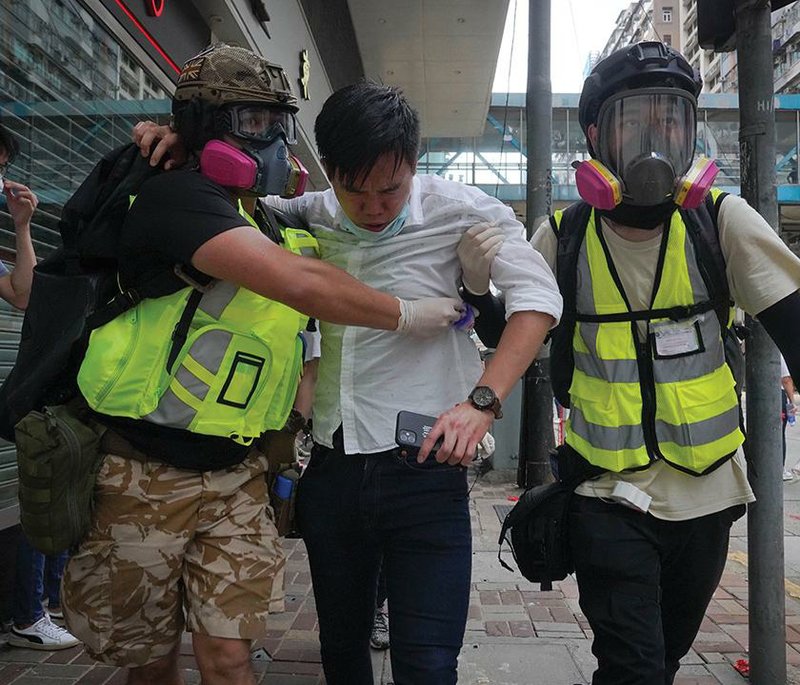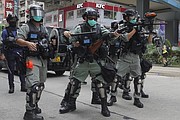HONG KONG -- Hong Kong police fired tear gas and a water cannon at protesters in a popular shopping district Sunday, as thousands took to the streets to march against China's move to impose national security legislation on the city.
Pro-democracy supporters have sharply criticized a proposal, set to be approved by China's rubber-stamp parliament this week, that would ban secessionist and subversive activity, as well as foreign interference, in the semi-autonomous Chinese territory.
The pro-democracy camp says the proposal goes against the "one country, two systems" framework that promises Hong Kong freedoms not found in mainland China.
[Video not showing up above? Click here to watch » https://www.youtube.com/watch?v=XwJGoVRISq4]
Crowds of demonstrators dressed in black gathered in the Causeway Bay district, chanting slogans such as "Stand with Hong Kong," "Liberate Hong Kong" and "Revolution of our times." Some carried posters declaring that "Heaven will destroy the Chinese Communist Party."
"If we don't come out today to fight back, this may be the last time," said Chris, a 19-year-old protester who gave only his first name as he had already been arrested once before for participating in an illegal protest. "Maybe tomorrow, Hong Kong will be China and we can't even say a single word of criticism on the internet without being arrested."
The protest was a continuation of a monthslong pro-democracy movement in Hong Kong that began last year and has at times descended into violence between police and protesters.
Police raised blue flags, warning protesters to disperse, before firing multiple rounds of tear gas. They later fired a water cannon at the demonstrators.
At least 180 people were arrested, mostly on charges of unlawful assembly, police said.
They also said some of the protesters threw bricks and splashed unidentified liquid at officers, injuring at least four members of the police media liaison team.
Still, the clashes were relatively restrained compared with violent clashes that marked the later months of protests last year. After most of the activists scattered Sunday, police remained on the streets of downtown, with some people shouting "communist thugs" at them.
MORE TO COME
The scenes marked the beginning of what is likely to be a long and restive summer in Hong Kong, as thousands pledge to never give up the fight against Beijing's control, despite the increasingly powerless situation they find themselves in.
Most protesters say they simply want to continue living with the freedoms they have always enjoyed rather than being subsumed into mainland China.
"I'm worried about my future, but it is pointless to think of that now," said a protester who gave only her last name, Fong, for fear of arrest. "I know we have no power against Beijing, but we still have to stand up, and say to the world that this is bad for Hong Kong," she said.
"I keep coming out to protest," said Hanna Ng, 16. "Bad things keep happening, but I don't know what else to do."
"I came out today to protest against the evil law China will impose on Hong Kong," said Billy Lai, a 34-year-old social worker. "If every one of us can do a little bit more, I hope we can bring changes to the society."
Ricky Chun, a retiree, said, "This is the only way we can express ourselves. ... We cannot just keep ourselves quiet and take whatever they give to us."
PROTEST'S TRIGGER
The bill that triggered Sunday's rally was submitted at the opening of China's national legislative session Friday. It would bypass Hong Kong's legislature and could allow mainland agencies to be set up in the city, sparking concern that Chinese agents could arbitrarily arrest people for activities deemed to be pro-democracy.
Speaking at an annual news conference during the legislative session, Chinese Foreign Minister Wang Yi said Sunday that the national security legislation for Hong Kong was "urgent and imperative" because of the last year's protests.
"These protests had posed a grave threat to Hong Kong's prosperity and stability, and to the practice of 'one country, two systems,'" Wang said.
"Excessive unlawful foreign meddling in Hong Kong affairs has placed China's national security in serious jeopardy," Wang said, but he characterized the new law as narrowly defined. He said it "does not affect the high degree of autonomy in Hong Kong."
"It does not affect the rights and freedoms enjoyed by Hong Kong residents. And it does not affect the legitimate rights and interests of foreign investors in Hong Kong," Wang said.
'BETRAYED BY CHINA'
Secretary of State Mike Pompeo has called the proposal "a death knell for the high degree of autonomy" that Beijing promised the former British colony when it was returned to China in 1997.
Chris Patten, the last British governor of Hong Kong before its handover to China, lamented what he called "a new Chinese dictatorship."
"I think the Hong Kong people have been betrayed by China, which has proved once again that you can't trust it further than you can throw it," Patten said in an interview with The Times of London.
Patten is leading a coalition of at least 204 international lawmakers and policymakers decrying the proposed legislation. The coalition called it a "flagrant breach" of the Sino-British Joint Declaration, a 1984 treaty that promised Hong Kong a high degree of autonomy even after the handover of Hong Kong to China in 1997.
President Donald Trump's national security adviser, Robert O'Brien, said it appeared that China was violating the treaty.
"And I can't see how Hong Kong remains the Asian financial center if the Chinese Communist Party goes through and implements this national security law and takes over Hong Kong," O'Brien said Sunday on CBS's Face the Nation, predicting that global financial firms and well-educated residents would flee.
[Gallery not loading above? Click here for more photos » arkansasonline.com/525hongkong/]
"That would be a tragedy for the people of Hong Kong, but it will also be very bad for China," he said, adding that Chinese assertion of dominance over Hong Kong would draw U.S. financial sanctions against both.
LEGISLATION DEFENDED
Bernard Chan, a top-level Hong Kong politician and delegate to the National People's Congress in Beijing, defended the legislation pushed by China, saying it was written into Hong Kong's Basic Law -- the city's mini-constitution -- but never enacted.
Chan expressed concern that Hong Kong would inevitably face economic hardship given trade frictions between the U.S. and China.
"I think we are definitely the collateral damage being dragged into this thing. But then, I don't think there's any alternatives," he said.
"But with or without this law, honestly, the U.S. and China are always going to be continuing this loggerhead for quite some time to come," Chan said. "China will remain as a threat to the U.S. in terms of the ... world economic dominance."
In a statement Sunday evening, an unnamed spokesperson for the Hong Kong government called the protesters "thugs" and the clashes "atrocities." The day's events confirmed "the necessity and urgency of national security legislation," the statement said.
Information for this article was contributed by Zen Soo and Dake Kang of The Associated Press; by Shibani Mahtani and Anna Fifield of The Washington Post; and by Vivian Wang, Austin Ramzy and Tiffany May of The New York Times.
A Section on 05/25/2020

